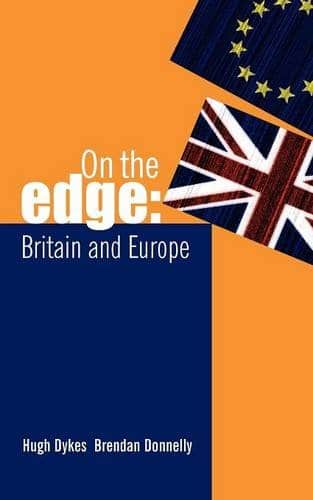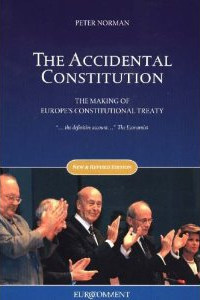Publications Recommended by the Federal Trust
From time to time the Federal Trust recommends publications which might be of interest to those who follow developments in the European Union. The Federal Trust receives no financial benefit from recommending these publications. Please contact the relevant publisher and/or distributor.
On the Edge: Britain and Europe by Hugh Dykes and Brendan Donnelly (February 2012)
 During the past twenty years the British discussion of European issues has increasingly lost contact with reality or rationality. Wilful ignorance, political opportunism and media manipulation have unrecognizably distorted the European debate in the United Kingdom. Even those in theory favourable to a central and constructive British role in the European Union have found themselves endorsing many of the premises of their opponents. In this short book, British attitudes to the European Union, particularly those of the media and political classes, will be critically reviewed. The authors conclude that Britain’s position within the Union is currently in great jeopardy; and that those who sincerely wish to ward off this danger need fundamentally to reconsider the political tactics and rhetoric they have employed until now.
During the past twenty years the British discussion of European issues has increasingly lost contact with reality or rationality. Wilful ignorance, political opportunism and media manipulation have unrecognizably distorted the European debate in the United Kingdom. Even those in theory favourable to a central and constructive British role in the European Union have found themselves endorsing many of the premises of their opponents. In this short book, British attitudes to the European Union, particularly those of the media and political classes, will be critically reviewed. The authors conclude that Britain’s position within the Union is currently in great jeopardy; and that those who sincerely wish to ward off this danger need fundamentally to reconsider the political tactics and rhetoric they have employed until now.
The EU Fiscal Crisis: Forcing Eurozone Political Union in 2011 by Graham Bishop (2011)
 The end of the euro would be the end of Europe – only tough collective action from eurozone leaders can prevent financial meltdown. But do political leaders fully realise the enormous scale of what is required and the frightening consequence of failure, and that intense financial and economic pressures are forcing far-reaching political changes in the eurozone? This searching and timely new study examines the driving forces and potential outcomes of the eurozone debt crisis.
The end of the euro would be the end of Europe – only tough collective action from eurozone leaders can prevent financial meltdown. But do political leaders fully realise the enormous scale of what is required and the frightening consequence of failure, and that intense financial and economic pressures are forcing far-reaching political changes in the eurozone? This searching and timely new study examines the driving forces and potential outcomes of the eurozone debt crisis.
Saving the European Union: The Logic of the Lisbon Treaty by Andrew Duff (2009)
 This book explains and justifies the EU’s Treaty of Lisbon. It is the first accurate and comprehensive description of what the entry into force of Lisbon treaty will mean. It provides logical answers both to those pro-Europeans who claim that Lisbon is of little importance and to those anti-Europeans who oppose further integration.
This book explains and justifies the EU’s Treaty of Lisbon. It is the first accurate and comprehensive description of what the entry into force of Lisbon treaty will mean. It provides logical answers both to those pro-Europeans who claim that Lisbon is of little importance and to those anti-Europeans who oppose further integration.
This book explains and justifies the EU’s Treaty of Lisbon. It is the first accurate and comprehensive description of what the entry into force of Lisbon treaty will mean. It provides logical answers both to those pro-Europeans who claim that Lisbon is of little importance and to those anti-Europeans who oppose further integration.
The Accidental Constitution: The Story of the European Convention by Peter Norman, 2nd Edition (2005)
 The Convention on the Future of Europe has opened an important new chapter in the 50 year history of the European Union.
The Convention on the Future of Europe has opened an important new chapter in the 50 year history of the European Union.
With a blend of narrative and analysis, Peter Norman’s book follows the Convention as it pursues the ambitious goal of crafting a durable constitution that can make a greatly expanded EU work and bridge the gap between its rulers and citizens.
Blending narrative and analysis, Peter Norman takes the reader through the Convention’s 18 months of frustrations and achievements. Negotiations go to the wire. Only at the last minute does it become clear that Giscard is able to deliver a single constitutional text to EU leaders at their June 20 European council in Thessaloniki and a complete draft constitutional treaty to the Italian presidency of the EU a month later.
In conclusion, the book assesses the Convention’s results against its goals of improving the EU’s efficiency, transparency and democratic accountability, and looks forward to the negotiations on the draft constitution in the Intergovernmental Conference of EU member states now underway. Despite compromises and linguistic lapses, the draft constitutional treaty simplifies the hideously complex treaties and structures of the Union. There are gains for democracy and accountability through increases in the law making role of the European Parliament and greater involvement of national parliaments in controlling power in Brussels.
Reviews
“Future historians will be profoundly grateful to Peter Norman. Mr Norman has produced what will undoubtedly be the definitive account of the wranglings over the convention. His book provides a detailed portrait of the political tensions that animated and divided the EU’s political elite at the beginning of the 21st century”.
Review in the Economist magazine, December 2003.
“It’s a thorough, detailed and readable account of the Convention’s 16-month journey from the end of February 2002 to July 2003. As a historical record of the Convention, it will probably be unsurpassed”.
Review in The European Voice newspaper November 2003.
“Norman attended nearly every meeting of the Convention and interviewed almost all its leading protagonists, and within a few months of its conclusion has produced what is sure to prove the definitive account of its work. In less skilled hands, such a book could have proved as dry as dust, but Norman has produced a lively and entertaining read.”
Dick Leonard, a former Brussels bureau chief of the Economist, writing in The Bulletin, Brussels, December 2003.
“I find it spell-binding: lucid, informed, caustic and even funny. It will be the definitively authentic chronicle of the Convention, and a rich source for generations of researchers and commentators for years to come. The complex story is told with such fluency that I will not be the only conventionnel who, having read the book, will understand a great deal more about what we were actually up to.”
Andrew Duff MEP and member of the Convention.
“The book makes a fiendishly complicated subject seem easily comprehensible. The twists and turns of the whole enterprise, often unexpected are vividly portrayed. And it tells the tale with a graceful sense of humour. What the book sets out very clearly is the state of the argument in Europe in 2003. No one should in future hold forth on European matters without having read and digested this book.”
Sir Roy Denman, retired director-general for external relations at the European Commission and a former European Communities Ambassador to Washington.
“Peter Norman’s ‘The Accidental Constitution’ is a masterful, reliable account of the Convention’s official proceedings and of the off-the-record discussions that took place. It is an impressive and unique book. I admire Peter Norman for his ability to provide such vivid insight of those events, as they unfolded. I consider it an ideal guide for a thorough understanding of the Convention’s historical significance and results.”
Lamberto Dini, former prime minister of Italy, and member of the Convention.
“The book is a masterpiece. It is perceptive of the dynamic and processes which produced the ‘consensus’ and judicious in its appraisal of the substance of what was finally agreed.”
Lord MacLennan of Rogart, Liberal-Democrat peer and member of the Convention.

